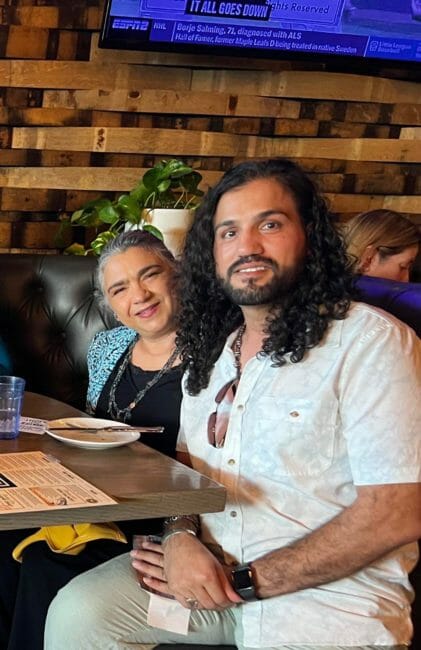It’s the fourth week of protests in the Islamic Republic of Iran, sparked by 22-year-old Mahsa Amini’s death after she was detained by morality police over what she was wearing.
From Berlin to Los Angeles, thousands around the globe have marched in solidarity with the Iranian people. And for some Alaskans, these protests hit close to home.
Finding refuge in Alaska
Samuel Bayanineek left Tehran in 2005. After spending more than four years in Turkey, he arrived in Anchorage as a refugee.
He was greeted by Minoo Minaei, a long-time Anchorage resident, who was volunteering at Catholic Social Services and was assigned as his interpreter.
“Sammy looked at my eyebrows and asked who did them,” Minaei said. “I told him I did. He said, ‘you do such a lousy job.’ And I just loved that, so I called my husband and said, ‘I think we have inherited a son.’”
Minaei left Iran when she was 13. She first arrived in Anchorage in 1980 and spent 33 years teaching in the Anchorage School District.
She eventually became Bayanineek’s godmother. He was a barber back in Iran and she helped him go to beauty school in Alaska to get his cosmetology license.
A new generation in Iran
“[My father] got us out before the revolution,” Minaei said about her journey out of Iran. “I have never really gone back, so I have never seen the change. I just read about it and it’s just heartbreaking. We have really gone backwards so far, and I don’t know if it’s ever going to go forward.”

By mid-October, 185 people — including 19 minors — had been killed in Iran, along with many injuries and thousands of arrests at the hands of government security forces. Videos of women and schoolgirls at the frontlines of the protests have circulated the internet.
“It is really heartbreaking to see how the women try so hard to fight with nothing in their hand except their brain,” Minaei said of the students protesting.
Bayanineek is hoping that this time, the protests can end in a “good revolution.”
“This was going to happen sooner or later because when you have a systematic religious government, this is exactly what’s going to happen,” he said. “For most of the younger generation of high schoolers and even younger than high school, people are tired and raising their voices.”
Minaei pointed to social media as another factor. She said the older generation witnessed the revolution, but never tasted freedom.
“If they are educated, they can see how much opportunity they could have,” she said. “I feel really sorry for them. I just really hope that the Western world would do something to help these people. And I don’t know if that will ever happen, if it’s just a can of worms that nobody wants to open.”
Fighting for their future
Every day, Bayanineek speaks to his mother in Tehran on the phone. And every day, she tells him that there are protesters on the street.
“The government should belong to the young generation today,” Bayanineek said. “They are the ones that should have the voice and run it.”
He said generations of witnessing the government “suck out all the resources from the country and get rich” while most citizens were suffering from recessions and bankruptcy has pushed the younger generation to the brink.
“Let’s hope the young generation and these women are going to change that because they have to,” Bayanineek said. “It’s a matter of the next generation.”
Protests have periodically erupted in Iran since the 1978 revolution, but none have successfully overturned their regime.
“The majority, the public, wants freedom and they can’t get it,” Bayanineek said. “But it doesn’t matter how long it takes, they will get it.”
“Home sweet home, Alaska.”
Bayanineek estimates that there are no more than 200 Iranians in Alaska, but the community of around 50 in Anchorage is tight-knit.
“We do need more protesting,” he said. “In Charlotte, California, D.C., they have protesters. I know because we don’t have a big community, it’s not going to be a big protest, but what we can do is to pass our voice in the media.”
During past protests, Minaei has written letters to U.S. senators — ranging from Ted Stevens to Lisa and Frank Murkowski — encouraging them to condemn the Iranian government and end the sanctions on Iran.
“The sanctions that we are constantly putting on that poor country are killing the poor,” Minaei said. “And the only thing we can do is basically encourage [the protesters] to be strong and to stay together.”
Bayanineek is hoping that he can go back and visit Iran once the regime is changed.
“Not permanently, though,” he said. “Alaska is my permanent home. I will never leave — home, sweet home, Alaska.”
In the meantime, Bayanineek tries to support from afar and hopes that people around the world will help too.
“For once in history, we should see the feminist revolution, and I hope it starts in Iran,” he said.
